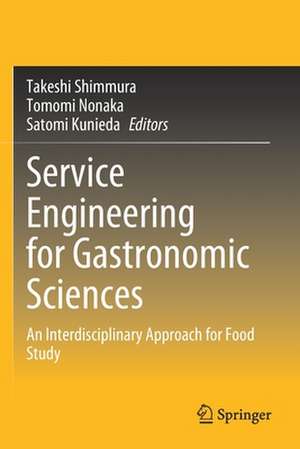Service Engineering for Gastronomic Sciences: An Interdisciplinary Approach for Food Study
Editat de Takeshi Shimmura, Tomomi Nonaka, Satomi Kuniedaen Limba Engleză Paperback – 24 iun 2021
In modern society, food study has become more complex, as it involves multiple fields of science. For instance, a long-lived society entails a number of problems for human beings. A balanced intake of nutrients is important for a healthy life, but in many cases, healthy food is not the most enjoyable. As such, it is important for the food industry to provide foods that are both tasty and wholesome, based on the sciences of gastronomy and nutrition.
Conventional food study proceeds along the lines of a specific field such as nutrition, agriculture, or gastronomy, though it should be conducted in an interdisciplinary manner. This book covers multifaceted research on food study torespond to today’s societal demands, based mainly on the natural and social sciences. It addresses a wide range of topics, including: food production management using mathematical modeling, operations research, and production engineering; evaluation of food products based on big data analysis; psychological experiments and ethnography; food products based on consumer behavior; organoleptic assessment and health improvement; design of physical dining environments using virtual reality, pedestrian debt recognition (human indoor position measuring), and observation of behavior.
Reporting on and assessing many studies conducted at actual business locations, the book offers a unique and highly practical resource.
| Toate formatele și edițiile | Preț | Express |
|---|---|---|
| Paperback (1) | 635.65 lei 43-57 zile | |
| Springer Nature Singapore – 24 iun 2021 | 635.65 lei 43-57 zile | |
| Hardback (1) | 641.71 lei 43-57 zile | |
| Springer Nature Singapore – 24 iun 2020 | 641.71 lei 43-57 zile |
Preț: 635.65 lei
Preț vechi: 747.82 lei
-15% Nou
Puncte Express: 953
Preț estimativ în valută:
121.63€ • 127.33$ • 100.64£
121.63€ • 127.33$ • 100.64£
Carte tipărită la comandă
Livrare economică 07-21 aprilie
Preluare comenzi: 021 569.72.76
Specificații
ISBN-13: 9789811553233
ISBN-10: 9811553238
Ilustrații: V, 190 p. 94 illus., 60 illus. in color.
Dimensiuni: 155 x 235 mm
Greutate: 0.29 kg
Ediția:1st ed. 2020
Editura: Springer Nature Singapore
Colecția Springer
Locul publicării:Singapore, Singapore
ISBN-10: 9811553238
Ilustrații: V, 190 p. 94 illus., 60 illus. in color.
Dimensiuni: 155 x 235 mm
Greutate: 0.29 kg
Ediția:1st ed. 2020
Editura: Springer Nature Singapore
Colecția Springer
Locul publicării:Singapore, Singapore
Cuprins
Part 1: Design for Value Creation.- Chapter 1. Design for Value Creation.- Chapter 2. Analysis and prediction of customer behaviors for restaurant management.- Chapter 3. Mathematical Modeling for Gastronomy Service Process.- Part 2: Production Management for Value Realization.- Chapter 4. Sensing of service provision processes.- Chapter 5. Systems Engineering Approach to Floorand Staff-shift Layout Design Floor.- Chapter 6. Design and Production Systems for Food Products.- Part 3: Evaluation by Human for Further Value Creation.- Chapter 7. The Intersubjective Valuation of Service.- Chapter 8. Consumer behavior for information on food products.- Chapter 9. School cafeteria experiments for food healthy messages.
Notă biografică
Textul de pe ultima copertă
This pioneering book on food study pursues an interdisciplinary approach to service science and the service engineering field. Further, it highlights a range of experiments conducted at actual business sites to verify the effectiveness of the proposed methodologies and theories.
In modern society, food study has become more complex, as it involves multiple fields of science. For instance, a long-lived society entails a number of problems for human beings. A balanced intake of nutrients is important for a healthy life, but in many cases, healthy food is not the most enjoyable. As such, it is important for the food industry to provide foods that are both tasty and wholesome, based on the sciences of gastronomy and nutrition.
Conventional food study proceeds along the lines of a specific field such as nutrition, agriculture, or gastronomy, though it should be conducted in an interdisciplinary manner. This book coversmultifaceted research on food study to respond to today’s societal demands, based mainly on the natural and social sciences. It addresses a wide range of topics, including: food production management using mathematical modeling, operations research, and production engineering; evaluation of food products based on big data analysis; psychological experiments and ethnography; food products based on consumer behavior; organoleptic assessment and health improvement; design of physical dining environments using virtual reality, pedestrian debt recognition (human indoor position measuring), and observation of behavior.
Reporting on and assessing many studies conducted at actual business locations, the book offers a unique and highly practical resource.
Caracteristici
Illustrates the latest studies conducted by service engineering researchers and presents a synthesized concept of serviceology Addresses data mining, simulation, design, Virtual Reality, production management, ethnomethodology, and sensory tests Integrates various theories and methodologies for food researchers, students, and businesspeople
